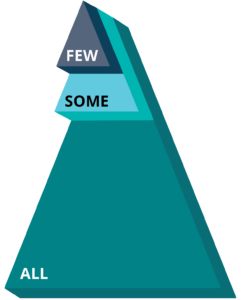Home » Positive Supports » Trauma Informed Approaches » Trauma Informed Approaches and the Public Health Model
Trauma Informed Approaches and the Public Health Model

Trauma informed care approaches are implemented across education and human service organizations. The triangle below describes a systems-change approach for promoting wellness and decreasing negative experiences due to trauma. The triangle below shows three levels of prevention: Universal or Tier 1, Tier 2, and Tier 3. Each tier includes an increasing level of intensity that can be used to support children and adults who have experienced trauma. Some people benefit from tier 1 while others may seek out tier 2 and tier 3 strategies in order to improve emotional wellness and quality of life.
Tier 1
Tier 2
Tier 3
Tier 1
Tier 1 universal strategies promote wellness and create safe and healing environments for all people. Universal strategies can be implemented in a home, organization, or community setting. These strategies include teaching everyone in a setting about the effects of trauma and how to build trusting relationships with other people. Trauma-informed approaches that are implemented on a universal level help people increase their emotional coping skills. Trauma informed settings are used to build positive, trusting environments where people consider the impact of each person’s experiences on their present reaction to every day events. Another universal trauma-informed goal is to prevent adverse interactions and events from occurring that can re-traumatize people who have experienced violence, natural disasters, loss, neglect or other negative events in their lives.
Tier 2
Tier 2 strategies include early identification of events and experiences that signal a person may need additional support due to past trauma. These strategies are used with some individuals in a setting. Increases in anxiety, extended periods of depression, or agitation and anger can be signals that a person may be experiencing the negative effects of past trauma. Group counseling or individual therapy or instructional sessions can be used to help people develop new emotional and social skills and to improve their quality of life.
Different types of strategies are used to help people including an evidence-based practice referred to as Trauma Focused Cognitive Behavior Therapy. Trauma Focused Cognitive Behavior Therapy includes several key elements: 1) learning how trauma can impact a person, 2) managing physiological responses to the memory of trauma, 3) restructuring thought patterns to deal more effectively with the memory, and 4) exposing a person to the place, things, or people that may trigger emotions, while practicing new skills or behaviors.
Tier 3
Tier 3 strategies are used to help someone who is having emotional problems that are chronic or severe due to past trauma. Some people need intensive supports in order to address the negative impact that trauma has had in their lives. Tier 3 strategies are tailored for each unique person. These strategies may be implemented over short or long periods of time. Multiple strategies are often used to support someone needing a Tier 3 plan. Counseling, Trauma Focused Cognitive Behavior Therapy sessions, person-centered planning, positive behavior support, or other strategies can be combined to create a complete plan for improving quality of life.

